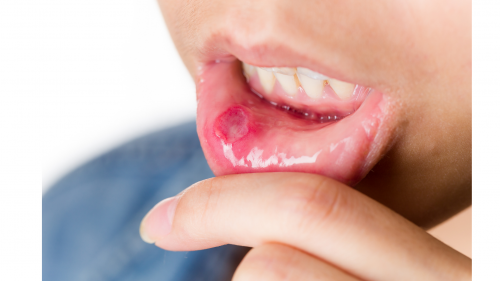Canker sores are a common condition that can disrupt the comfort of the mouth and cause pain while eating or talking. However, for some people, canker sores can become a recurring problem and disrupt their daily quality of life. This article will discuss why recurring canker sores happen when to be concerned, and when it's best to consult a doctor. We will also explore treatment options that doctors may recommend to address recurring canker sores.
Canker sores are small sores that form inside the mouth, such as on the inner cheeks, tongue, or gums. Usually, canker sores will heal on their own within one to two weeks. However, for some individuals, canker sores can occur repeatedly, with new sores appearing every few weeks or months. This could be a sign that there is an underlying health issue.
Several factors can contribute to recurring canker sores, including
- Weakened immune system: A weakened immune system can make a person more vulnerable to infections and inflammation that cause canker sores.
- Stress: High levels of stress can affect hormonal balance and trigger the development of canker sores.
- Nutritional deficiencies: Lack of certain vitamins and minerals, such as vitamin B12, iron, or folic acid, can contribute to recurring canker sores. d. Allergies: Some individuals may have an allergic reaction to certain foods or chemicals that lead to canker sores. e. Other health issues: Certain medical conditions, such as inflammatory bowel disease, lupus, or HIV, can cause recurring canker sores.
Recurring canker sores are usually not a serious problem and can be managed with simple lifestyle changes. However, there are some signs to watch out for that might warrant concern: a. Canker sores that do not heal for an extended period. b. Increasing frequency of canker sore outbreaks. c. Very large or deep canker sores that cause difficulty in eating and drinking. d. Canker sores accompanied by fever or other unusual symptoms.
Treatment for recurring canker sores will depend on the underlying cause. Some possible treatment options that doctors may recommend include:
- Antiseptic medications or mouthwashes to reduce pain and aid in canker sore healing.
- Vitamin and mineral supplements if nutritional deficiencies are detected.
- Specific treatments to address issues with the immune system.
- Stress prevention and management through relaxation techniques and meditation.
- Treating canker sores involves managing your pain while allowing the cells in your mouth to heal and regenerate after cancer treatment. If you experience any sensitivity in your mouth or notice the formation of sores, inform your doctor. They may recommend the following treatments:
-
Topical Painkillers: These medications can be directly applied to your mouth sores. Keep in mind that using painkillers may temporarily numb your mouth, so be cautious when eating or brushing your teeth to avoid unintentional injury.
-
Coating Agents: These medications create a protective film over the entire lining of your mouth, shielding the sores and reducing pain while eating or drinking.
-
CURATICK™ Oral Wound Dressing is a special tool designed to protect oral wounds by creating a physical barrier over the wound. It is specifically meant to be used for ulcers and small wounds in the mouth, like canker sores and injuries from biting, braces, or poorly-fitted dentures. By applying CURATICK™ Oral Wound Dressing, the wounds are shielded and can heal more effectively, as it contains nourishing vitamin E.
Moreover, CURATICK™ Oral Wound Dressing has a Light Mint flavor that helps reduce bad breath caused by canker sores or wounds. When CURATICK™ Oral Wound Dressing comes into contact with saliva, it forms a hydrogel, which eases pain when the patch is applied. The best part is that CURATICK™ Oral Wound Dressing remains sticky for up to 4 hours, so there is no need to change the patches frequently.
-
-
References:
- Scully C. (2016). Oral and maxillofacial medicine: The basis of diagnosis and treatment (3rd ed.). Elsevier.
- Jurge S. et al. (2017). Recurrent aphthous stomatitis: A review. Journal of Clinical and Experimental Dentistry, 9(9), e1167-e1175.
- National Institute of Dental and Craniofacial Research (NIDCR). (2021). Canker sores (mouth ulcers). NIH Publication No. 17-5751.






